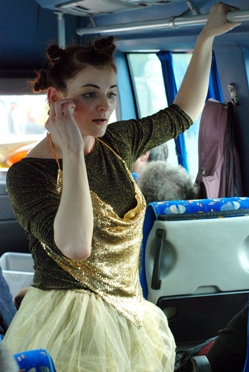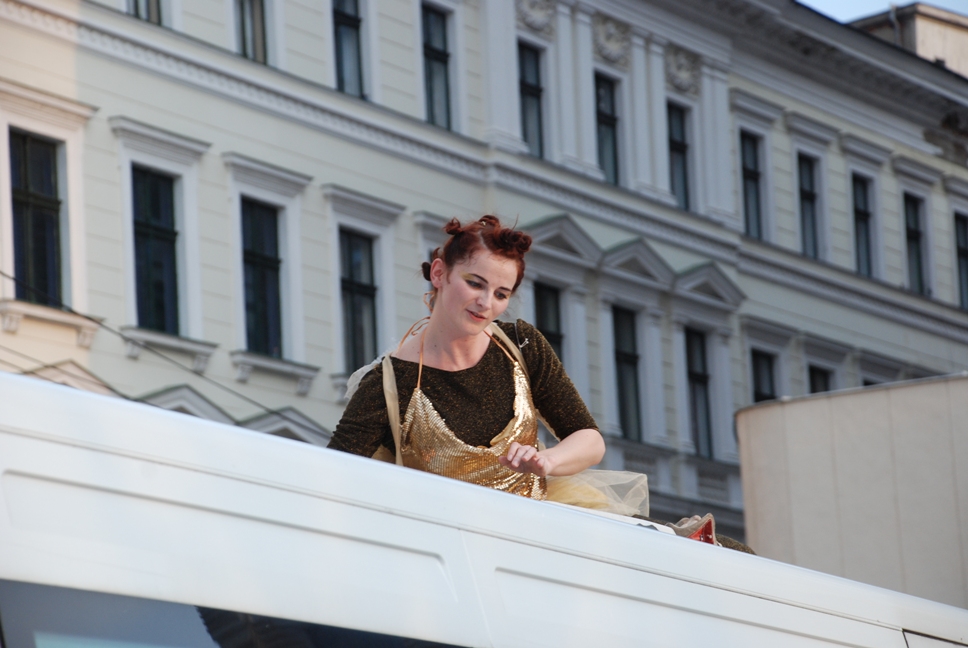(Részletek az egyetem chartájából)
The
(Taken from the University Charta.)
MADY-BABY
„Otthon… én nem vagyok otthon. Itthon sem vagyok itthon. De otthon sem
vagyok otthon. Otthon nem vagyok itthon, itthon nem vagyok otthon. Én nem
leszek otthon se itthon, se otthon.”
“Home… I am not at home. I am not at home here. But I am not at home at home either. At home, I am not at home, and here I am not at home, either. I won’t be at home neither here, nor there.”
(Mady)

A monodráma, melyet Borbély B. Emília játszik, három román fiatalról és az önfeláldozásról szól. Egy nehéz körülmények között élő, bukaresti lányt, Voicu, az Írországban élő barátja rávesz, hogy költözzön ki hozzá. A repülőtéren Mady találkozik Bogdánnal, együtt utaznak és a továbbiakban hármójuk sorsa egybefonódik. A fiúk önmegvalósításról szóló harcában, a lány eszközzé, majd áldozattá válik. Mivel mindketten Mady prostitúciójából húznak hasznot, miután terhes lesz, egyikük sem vállalja a következményeket, inkább úgy döntenek: megölik.
Az előadás olvasatában Mady története, egy feltámadástörténet, amely a jóság és bűn, alászállás és megváltás, önzés és áldozathozatal fogalmai köré csoportosul. Eltompult, részvétlen korunkban Mady hús-vér, megtapasztalható valósága, élő tanubizonyságaként szolgáljon, az önzetlen szeretetnek, amellyel, ha figyelmesek vagyunk, civil életszféránkban bárhol találkozhatunk, köztereken és átjárókon, autóbuszon és bevásárlóközpontokban, útszéleken és kórházakban, a másikban és önmagunkban.
Gianina Cărbunariu, a darab szerzője, a bukaresti Színház- és Filmművészeti Egyetemen tanult rendező szakon, majd a Royal Court Theatre és a Lark Theatre drámaíró-ösztöndíjasa volt. Évfolyamtársaival közösen indították el a dramAcum nevű projektet, amely 2002 óta az új román dráma legfontosabb műhelye.
Cărbunariu sajátos
munkastílusa, hogy a drámairodalom valamely klasszikusának újraértelmezése
helyett a majdani előadás társadalmi közegéből indul ki színészeivel, és a
közös műhelymunka során írja meg az előadás szövegét.

The monodrama performed by Emília B. Borbély tells about three young Romanians and self-sacrafice. A girl from Bucarest, Voicu, living at home in harsh circumstances, moves to Ireland on the counsel of a friend already working there. On the airport, Mady (Voicu) meets Bogdan, they travel together, and the destinies of the three of them forge together. In the fight of the two boys who want to establish themselves, Voicu becomes first a weapon then a victim. Both of the boys earn their living from Mady’s prostitution, but when she gets pregnant, neither of them wants to face the consequences, so they decide to kill her.
In the reading of the performance, Mady’s story is that of a resurrection, and it focuses on the concepts of goodness and sin, damnation and absolution, selfishness and sacrifice. In our deadened, merciless age, Mady’s flesh and blood reality serves as a living example of unselfish love, with the realization of which we can encounter anywhere in our civil life with enough attentiveness: in public spaces, on buses, in supermarkets, on the sides of the roads, in hospitals, in the other and in ourselves, too.
Gianina Cărbunariu, the author of the play has graduated from the University of Theatre and Film in Bucarest as a director. She has participated in playwright scholarships at the Royal Court Theatre and at Lark Theatre as well. Together with her university fellows, she launched the project dramAcum, which since 2002 represents the most prominent studio in the scene of the new Romanian drama. The essence of Cărbunariu’s peculiar style is that instead of reworking a classical work she sets off from the social particularities of the play’s future audience, and she writes the script in collaboration with the actors.